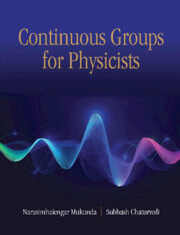Book contents
- Frontmatter
- Dedication
- Epigraph
- Contents
- Preface
- List of Abbreviations
- 1 Basic Group Theory and Representation Theory
- 2 The Symmetric Group
- 3 Rotations in 2 and 3 Dimensions, SU(2)
- 4 General Theory of Lie Groups and Lie Algebras
- 5 Compact Simple Lie Algebras – Classification and Irreducible Representations
- 6 Spinor Representations of the Orthogonal Groups
- 7 Properties of Some Reducible Group Representations, and Systems of Generalised Coherent States
- 8 Structure and Some Properties and Applications of the Groups Sp(2n,ℝ)
- 9 Wigner’s Theorem, Ray Representations and Neutral Elements
- 10 Groups Related to Spacetime
- Index
Preface
Published online by Cambridge University Press: 24 November 2022
- Frontmatter
- Dedication
- Epigraph
- Contents
- Preface
- List of Abbreviations
- 1 Basic Group Theory and Representation Theory
- 2 The Symmetric Group
- 3 Rotations in 2 and 3 Dimensions, SU(2)
- 4 General Theory of Lie Groups and Lie Algebras
- 5 Compact Simple Lie Algebras – Classification and Irreducible Representations
- 6 Spinor Representations of the Orthogonal Groups
- 7 Properties of Some Reducible Group Representations, and Systems of Generalised Coherent States
- 8 Structure and Some Properties and Applications of the Groups Sp(2n,ℝ)
- 9 Wigner’s Theorem, Ray Representations and Neutral Elements
- 10 Groups Related to Spacetime
- Index
Summary
It has rightly been said that the mathematical theory of groups and group representations is a magnificent gift of nineteenth century mathematics to twentieth century physics. While this is particularly true within the framework of quantum mechanics, with the passage of time its relevance within classical physics has also become well understood and greatly appreciated. Today the importance of group theoretical ideas and methods for physics can hardly be overemphasised; and over the past century or so, a veritable profusion of books devoted to this theme, many of them gems of the literature, have appeared.
The present monograph is primarily based on lectures given by one of us (NM) at the Institute of Mathematical Sciences in Chennai, India, in the Fall of 2007. The lectures were prepared and presented at the invitation of Rajiah Simon, to whom both authors are indebted for his support and encouragement.
The course was titled ‘Continuous Groups for Physicists’ and consisted of about 45 extended lectures over a two month period. Its aim was to introduce the basic ideas of continuous groups and some of their applications to an audience of post graduate and doctoral students in theoretical physics. After an introduction to the basic ideas of groups and group representations (mainly in the context of finite groups and compact Lie groups), the course presented a selection of useful, interesting and quite sophisticated specific topics not often included in standard courses in physics curricula. The methods and concepts of quantum mechanics served as a backdrop for all the lectures.
The real rotation groups in two and three dimensions are followed by an account of the structures of Lie groups and Lie algebras, and then a description of the compact simple Lie groups. Their irreducible representations are described in some detail. Some of the ‘non standard’ topics that follow are: spinor representations of real orthogonal groups in both even and odd dimensions; the notion of the ‘Schwinger’ representation of a group with examples, induced representations, and systems of generalised coherent states; the properties and uses of the real symplectic groups, which are defined only in real even dimensions, and their metaplectic covering group, in a quantum mechanical setting; and the Wigner Theorem on the representation of symmetry operations in quantum mechanics.
- Type
- Chapter
- Information
- Continuous Groups for Physicists , pp. xv - xviPublisher: Cambridge University PressPrint publication year: 2023



